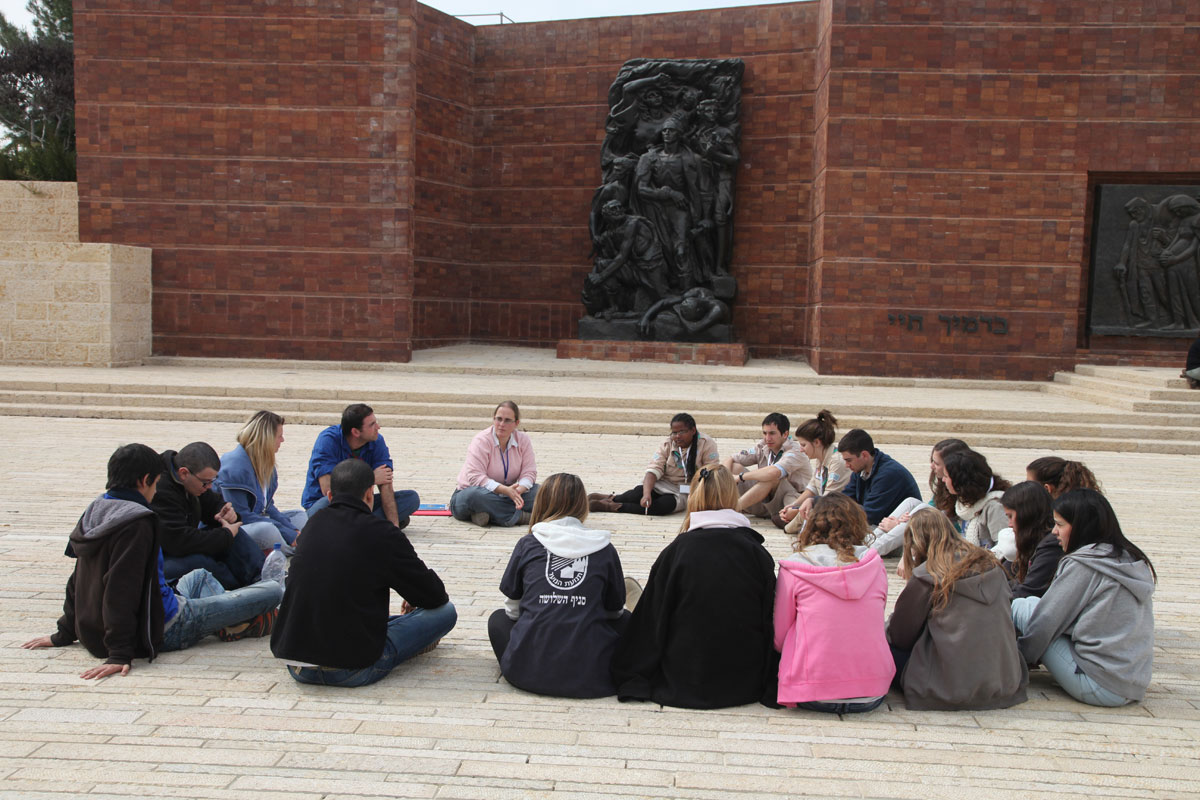
Students participating in an educational activity at Yad Vashem
As a teacher of Jewish Studies for the past 20 years in both England and Gibraltar, one of the major obstacles I have encountered is how to best teach the Holocaust to a generation that, regrettably, has not been sufficiently informed or educated regarding this momentous part of our recent history.
The oft-quoted citation “history repeats itself” resonates strongly with the Jewish people regarding circumstances of persecution and antisemitism. As a child of survivors, I passionately believe that no matter how difficult it may be to teach this subject matter, everyone must be educated on this subject. I know this is a challenge, but I believe it is one worth expending energy to solve. Inscribed on one of the barracks in Auschwitz I is a quote from George Santayana stating: “One who does not remember history is bound to live through it again.” Teachers bear the tremendous responsibility of accurately and effectively educating their pupils of such life lessons.
Still, the dilemma over how to prepare materials for this difficult subject remains a taxing one. Recently, I found the help I was searching for: an opportunity to join a group of British educators for weeklong program at the International School for Holocaust Studies at Yad Vashem in Jerusalem. Thanks to The British Friends of Yad Vashem, some 20 British primary and secondary teachers involved in Holocaust education were invited to this tailor-made seminar, in which we heard lectures and held discussions with top experts and historians on topics ranging from antisemitism and Nazi ideology to a historical perspective on the ghettos and using poetry to teach the Holocaust. We were furnished with a range of methods to teaching the difficult subject matter, and provided with vital tools for combating Holocaust denial. We took guided tours of the Yad Vashem campus, including the Holocaust History Museum, the Archives, the Valley of the Communities, and the Avenue of the Righteous Among the Nations. We also met with Holocaust survivors and visited various sites in Jerusalem. One of my colleagues told me that the seminar indeed "opened her eyes to new ways of teaching the Holocaust."
But to me, the most important aspect of the seminar was how to adapt each lesson to make sure it is age appropriate, and allows students of all backgrounds to feel they are in a safe learning environment. The lecturers took pains to explain that teaching the Holocaust should never be a negative or scary experience, rather an environment in which students can discover their identity through the life lessons the topics can teach us.
Now that I am back in the classroom, I am still digesting all that I learned. But among the ideas that most impacted me was with how much of my own Jewish self I have become more in tune. This in turn has helped me focus on encouraging my students to learn about their own identities, as well as increase their awareness of the different communities around them.
Above all, I firmly believe that we must all insist that the national curriculum in every school include Holocaust education. It should not be mentioned only in the context of World War II. The extent to which the Jewish nation was persecuted and murdered by the Nazis and their accomplices is a part of who we are, as Jews, but it is equally part of who we all are, as members of the human race. Its implications are always current – recognition of right and wrong, balances of power and the humane treatment of others, the value of life and the tragedy of death. The Holocaust was an extreme example of the extent that humans can fall to the lowest depths of morality, or soar to the highest ethical peaks. It was cataclysmic, and as such its impact is still felt by all of us, and is very much part of our identity. But it must be learned – and taught – correctly, so that its meaning is properly absorbed.
I am extremely grateful to Yad Vashem for all the hard work that they have put into making teaching resources adaptable for all the age groups. The lesson plans and suggestions on the Yad Vashem website have allowed me to create a working syllabus for all the children I teach, and are invaluable to thousands of other educators worldwide, most of whom are unable to visit the Mount of Remembrance.
I am now preparing my Year 12 students for their annual trip to Poland, and with the tools and teaching methods I acquired during the seminar I know my students will have a much more enriching learning experience, enhancing awareness of their own Jewish and human identity. I know this will lead them down the best path towards whatever the future holds.









